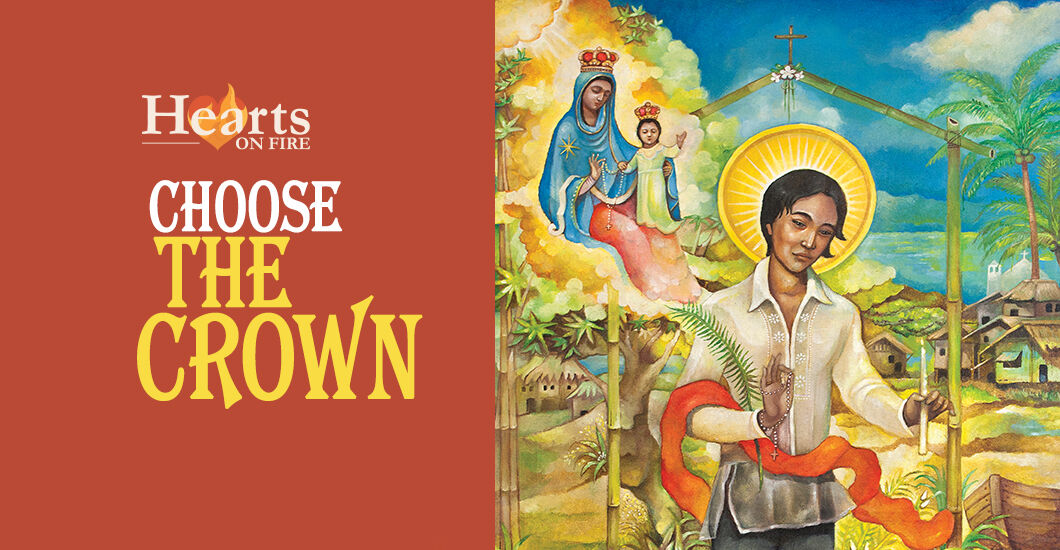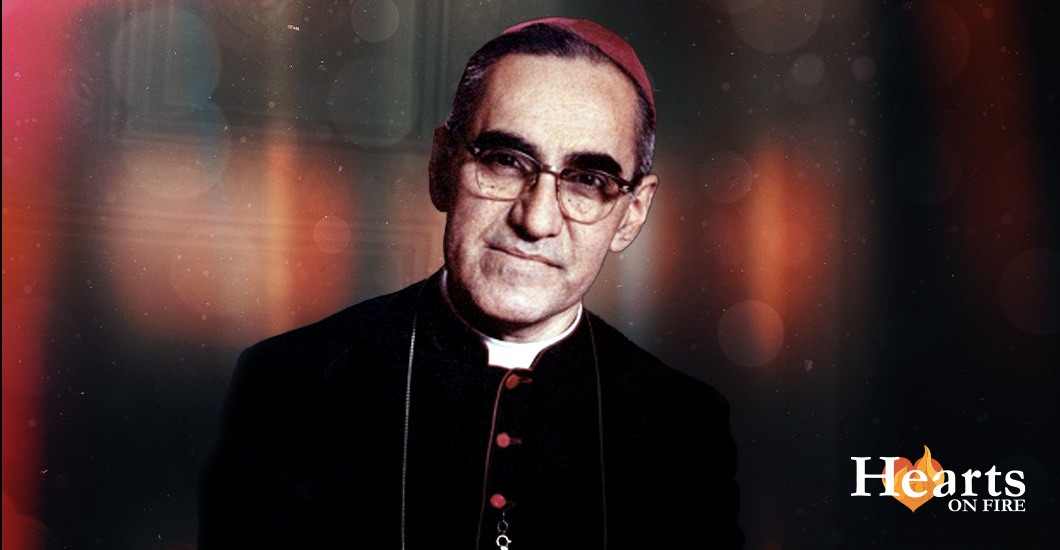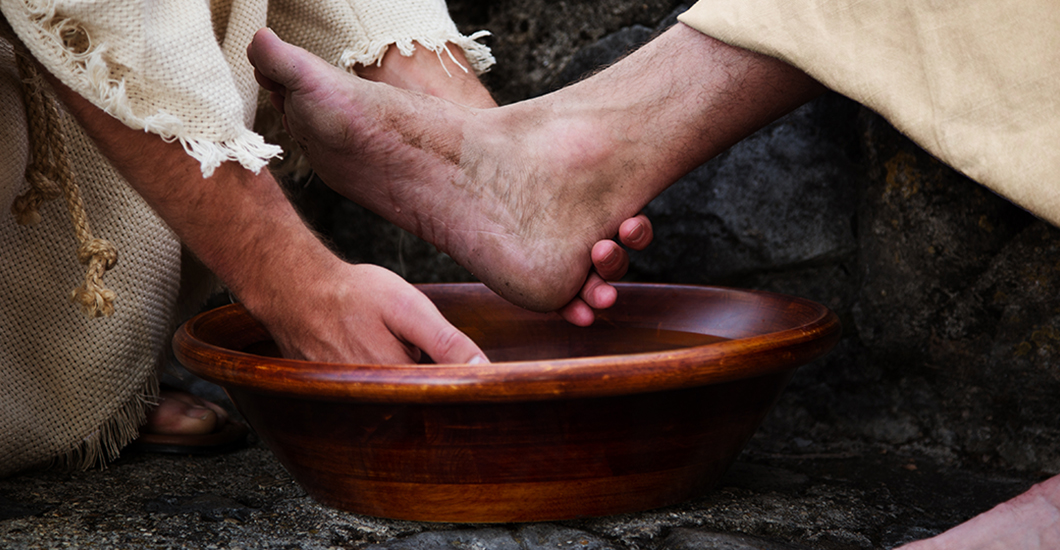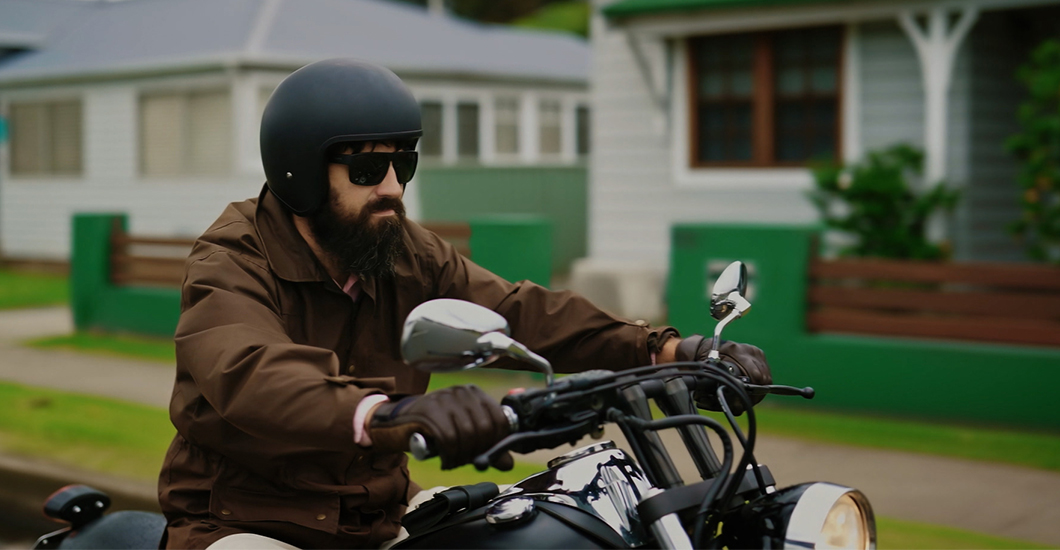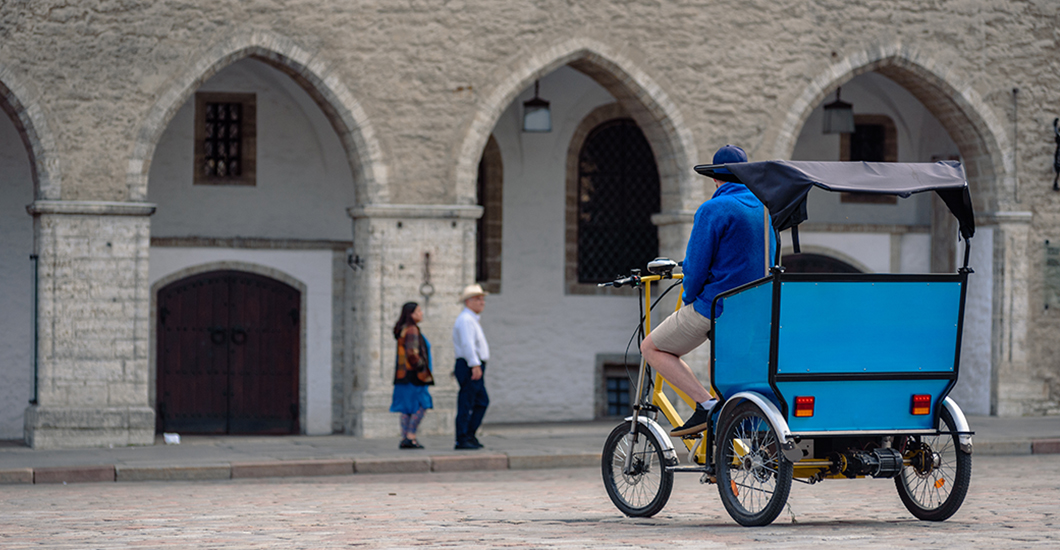Home/Evangelize/Article
Trending Articles
Choose the Crown
“I am a Catholic and I will die for God with a willing and ready heart. If I had a thousand lives, I would offer them all to Him.”
These were the dying words of a man who found himself in a situation where he could choose whether to live or die.
Lorenzo Ruiz, born in Manila in 1594. His Chinese father and Filipino mother were both Catholic. He grew up with a Dominican education, served as an altar boy and sacristan, and eventually became a professional calligrapher. A member of the Confraternity of the Most Holy Rosary, Lorenzo married and had two sons with his wife, Rosario.
In 1636, his life took a tragic turn. Falsely accused of murder, he sought the help of three Dominican priests who were about to undertake a missionary journey to Japan, despite the brutal persecution of Christians taking place there. Lorenzo had no idea until they had set sail that the group was heading to Japan and the danger that awaited there.
Fearing Spain would use religion to invade Japan as they believed they had done in the Philippines, Japan fiercely resisted Christianity. The missionaries were soon discovered, imprisoned, and subjected to many cruel tortures which included having huge quantities of water forced down their throats. Then soldiers took it in turns to stand on a board placed across their stomachs, forcing the water to surge violently from their mouths, nose, and eyes.
Finally, they were hung upside-down over a pit, their bodies tightly bound to slow circulation, prolong pain, and delay death. But one arm was always left free, so the victim could signal his intent to recant. Neither Lorenzo nor his companions recanted. In fact, his faith grew stronger as his persecutors interrogated him and threatened death. The holy martyrs hung over the pit for three days. By then, Lorenzo was dead and the three priests who were still living were beheaded.
A quick renunciation of their faith could have saved their lives. But instead, they chose to die wearing a martyr’s crown. May their heroism inspire us to live our faith with courage and without compromise.
Graziano Marcheschi serves as the Senior Programming Consultant for Shalom World. He speaks nationally and internationally on topics of liturgy and the arts, scripture, spirituality, and lay ecclesial ministry. Graziano and his wife Nancy are blessed with two daughters, a son, and three grandchildren and live in Chicago.
Related Articles
Latest Articles
“Those who surrender to the service of the poor through the love of Christ will live like the grain of wheat that dies,” preached Romero in his last homily. During the time when Oscar Romero was appointed as the Archbishop of San Salvador in 1977, the country was suffering from a severe economic and political crisis. With the death of his friend Father Rutilio Grande by the paramilitaries, the Archbishop became an outspoken critic of the government. The prelate, during his trips abroad, exposed the human rights abuses prevailing in the country. When the military junta seized the country, he began a radio broadcast of his sermons, openly criticizing the government for torture and mass murders. The act gained him the sobriquet, ‘The voice of those without voices.’ In a sermon on 23rd March 1980, the Archbishop implored the soldiers to stop executing government orders and, as Christians, obey God’s orders instead. The next evening, Romero celebrated Mass in a small chapel at Hospital de la Divina Providencia, a Church-run hospital specializing in oncology. After delivering the sermon, as he moved to the center of the altar, a red car stopped before the chapel, and a gunman stepped out of the vehicle, firing two shots at the Archbishop. The bullets went straight through Romero’s heart, and he breathed his last at the altar. His legacy has since inspired Catholics and non-Catholics around the world to stand against human rights abuse and fight for peace and justice. During the canonization of Archbishop Oscar Arnulfo Romero in 2018, Pope Francis wore the same blood-stained belt that Romero wore when he was killed at the altar. The Catholic Church honors this heroic life as the Patron Saint of Persecuted Christians.
By: Shalom Tidings
MoreThis is the best paradigm of master-slave dynamics the world has ever seen… In the early ‘60s, an emerging blue-rock band, The Rolling Stones, let loose a misogynistic song, Under My Thumb, that illustrates a certain social dynamic. We hear: Under my thumb The girl who once had me down Under my thumb The girl who once pushed me around … It’s down to me, yes it is The way she does just what she’s told, Down to me, the change has come She’s under my thumb, Ah, ah, say it’s alright. As offensive as these lyrics are, they contain a paradigm of the dominant consciousness of a society of how people relate to each other in the political, economic, and social domains. 19th-century German philosopher Friedrich Hegel explained this dynamic with his notion of the master-slave dialectic, which said that one’s sense of self-worth is directed towards someone who is perceived as unequal to oneself. Like The Rolling Stones, Hegel is talking about very dark social relationships in which the ego seeks to be in control, to dominate others to obtain one’s needs and to obtain privilege and status. So, the world is divided into insiders and outsiders— those at the top and those at the bottom. Or, as Bruce Springsteen once sang: “Down here, it’s just winners and losers, and Don’t get caught on the wrong side of that line” (Atlantic City from Nebraska). For those who are on the winning side, they want to keep things the way they are because the status quo works to their advantage. So, the master-slave dialectic seems to work at all levels. Along God’s Way Now, even before Hegel et al., the authors of the Old Testament were concerned about this problem because their central story was the Exodus Experience, which was a movement from oppression to liberation in which God identifies with the oppressed and resists the oppressor. God, working through Moses, brings the people out of servitude and guides them to the Promised Land—a state of justice and human flourishing. In doing so, God overcomes the master-slave dialectic, which is the central work of the God of Israel. Now, fast-forward 1200 years to Yeshua, Jesus of Nazareth, around 33 A.D., who appears in the hills of Galilee. On the lips of this young man who spoke as one having authority was the message that the Kingdom of God was at hand. That is, God’s way of ordering things is coming about, and this Kingdom is perfectly personified in Jesus. What God has in mind in how we organize ourselves radically differs from the master-slave dialectic. What does Jesus have in mind when he proclaims and lives in the Kingdom of God? The best source is the Sermon of the Mount in Matthew’s Gospel, chapters 5-7. In the Kingdom, we wouldn’t be hungry and thirsty for domination, but we would hunger and thirst for righteousness. Rather than clawing for the highest position, we should embrace mercy, tenderness, and compassion. Not stuck in the dreadful lex talionis: “An eye for an eye, a tooth for a tooth” ethic, but if someone slaps you on the right cheek, show him the other. If someone takes your outer garment, give him your shirt as well. And love not just your neighbor but your enemy as well. With that background in mind, Jesus will put into action His teachings in a very strange episode during the Passover Meal by washing the feet of his disciples (cf. John 13:1-20). Jesus will radically overturn the master-slave dynamic by becoming the slave, the servant. At the Last Supper, He takes off His outer garment and puts a towel around His waist in the posture of a slave. Then He proceeds to do something that is so low that only the lowest slave would be expected to do. He begins to wash their feet. Peter was so shocked that he protested and said to Him, “You will never wash my feet.” Jesus answered, “Unless I wash you, you have no share with Me.”(John 13:8) How To Be Kingdom People? Just as the Israelites passed through the Red Sea, the Washing of the Feet is a radical new beginning: Peter, do you want to be a member of the Kingdom of God that I proclaim? Do you want to participate in this new way of being? If so, you must pass through the waters of washing the feet of others and see yourself humbly serving them. The movement of the Exodus Experience to the Washing of the Feet leads us to the Eucharist. Knowing how challenging it will be to become Kingdom people, Jesus chose to be always with us. We hear in Paul’s first letter to the Corinthians: “On the night when He was betrayed, took a loaf of bread, and when He had given thanks, He broke it and said, ‘This is My body that is for you. Do this in remembrance of Me.’ In the same way, He took the cup also, after supper, saying, ‘This cup is the new covenant in My blood. Do this, as often as you drink it, in remembrance of Me.’”(1 Corinthians 11:23-25) This is the climax of Jesus’ public ministry, which will express the fullness of the Kingdom of God. What does Jesus do when He sums up what His life and ministry are all about? He gives himself away! “This is My body”—for a first-century Jew, that meant this is me; this is my person. “This is My blood”—everything I am is poured out for you. The Washing of the Feet is where the master becomes the slave. It challenges us to make our lives one of self-giving generosity as a template for all our relationships. Giving away His body and blood is our initiation into the dynamics of the Kingdom of God, which is why the Eucharist is the ‘fount and summit’ of our worship and life. How can we contrive to undermine the dynamics of the master-slave dialectic and give ourselves away?
By: Deacon Jim McFadden
MoreAndrew Byron unfolds the story of the profound experience he had when he called upon the name of Jesus! In December 1996, just two days before Christmas, my life took a devastating turn. My best friend, with whom I had grown up and who was about to become the youngest pilot instructor in Australia, died in a plane crash right in front of his family. I can still remember the feeling when my father informed me about my friend's passing. Although it didn't sink in at first, I remember how I broke down at the funeral. Soon, I became grief-riddled, depressed, and lost all hope. I tried to self-medicate with drugs and alcohol, which only led to greater depression, and I became very suicidal. Finally, I felt that the only way to escape the misery in life was to leave home. The U-turn I decided to leave for Queensland, miles away from my home in Tom Price, hoping that I would get a job, probably picking fruit. So, after school, instead of getting off at my stop, I continued my journey and got off at the highway. While hitchhiking along the Pacific Highway, an older man stopped to give me a ride and urged me to call home and inform my parents about my whereabouts. I called home and reached my father, who asked, "What are you doing? Why are you up there?" I said: "I'm leaving home," and he replied that I was breaking his heart. I was so consumed by drugs that I couldn’t grasp how leaving home impacted my parents. When I got back in the car with him, he persuaded me to visit my aunt's house at Old Bar beach. After dropping me off, he left. Although it was cold, I walked to search for my aunt's house. Suddenly, a car pulled over and offered me a ride. They invited me to stay at their home for the night. I was deeply touched by their gesture and chose to join them. At their home, they had a carton of beer, and we began drinking. They said I could live with them if I would sell drugs for them. I agreed and started partying with more drugs and alcohol. But soon, a realization struck me that I had a loving family. I also realized I had just sunk into a worse situation. When I told them that I was going back home, they said I couldn't leave, and if I did, they would have to kill me. They began torturing me with frying pans and steel-capped boots. They stripped me, tied my hands to my ankles, and blindfolded me with my shirt. I was dragged into a car boot. I could feel that my jaw was dislocated, my nose was broken, and I was in tremendous pain. I'd lost a lot of blood. They pulled over the car, and two men dragged me out of the boot. I was pretending to be dead, trying to stay stiff, but as they pulled me out, my elbow bumped into the boot of the car, and they realized I was still alive. They placed a large kitchen knife against my back and started hitting it with a rock. As the knife went up my spine, I felt this was my death; I was dying. They thought I was dead and threw me down the cliff. I was in extreme pain. Though blindfolded, I managed to climb over a big log but ended up in the water. The water was very cold, and as I put my head in, I realized I shouldn't give up. I could feel my breath getting shorter, my body shutting down, and a great darkness coming over me. I knew that I was going to hell. That was a terrifying moment! I cried out to God. He saved me! At that moment, I was enveloped in a sense of peace—an overwhelming warmth. So, I laid in that creek in the cold water in absolute joy, which I've never experienced since. Whenever life gives me trouble now, I always remember that moment. Before I Passed Out When the sun rose, I began climbing the cliff by grabbing saplings. I fell down several times, but eventually, I reached the top of the road. I asked God what to do, and He said: "Go right." So I walked. I don't know how far it was, but I found a Ranger's Cottage. No one was home, so I grabbed a brick and broke the window. I rang Triple Zero*, took a hot bath, and went to the fridge, where there was one beer. I had no idea where I was. I rang Triple Zero again. Looking out the window, I saw the car that had dropped me off the previous night driving past very slowly as if about to turn into the driveway. At that same moment, a police car and an ambulance came up the driveway, causing the car to speed off. The ambulance crew assessed me and said they couldn't transport me by road and would have to get a helicopter, considering my condition. The Westpac rescue helicopter landed, and the pilot got out and asked: "Do you mind if I pray with you?" He laid his hand on my head, and I passed out. It was February 27, 1998; My entire life changed that day. I woke up in the hospital and soon learned that the knife had gone up my spine and came to rest, touching the sheath of the nerve that controls breathing. A surgeon from Sydney had to fly in to remove the knife surgically. Finding My Way Overcoming the greatest chapter in my life, I moved to Sydney in 1999, where I attended the Youth Mission. While being there, I experienced a profound conversion and truly fell in love with Jesus. I laid everything down for Jesus, and again, I was filled with peace. I now realize that whenever any difficult or traumatic situation or circumstance comes up in my life, I recall the thought I had while lying at the bottom of the cliff—just look up and understand that God already knows; He goes before us and has every situation under control. I have to trust Him, and it's a beautiful thing. Later, I moved to Melbourne, where I connected with the Disciples of Jesus. This Covenant Community has been very good for formation. Through the Ministries, I learned the importance of God's armor. In the community, brothers in Christ can lean on one another, share their experiences, and walk the journey together. When I had my addictions to drugs and alcohol, I couldn't escape their grasp over my life. I tried many things, including cutting off friendships and isolating myself, but nothing seemed to work. The only thing that could free me from the addiction was Jesus—trusting Him and allowing Him to enter my life. I love Jesus very dearly. For anyone suffering from addictions, I would say that Jesus is the way. *Triple Zero (000) is the primary national emergency telephone number in Australia.
By: Andrew Byron
MoreNo trip lasts forever, but how do we convince a child that it is time to let go? I lived in Charlotte, North Carolina, for a while, and out of all the jobs available, I found myself pedicabbing. That's right, I was tasked with bicycling people around the city. Of course, I was in the best shape of my life. I carried numerous people, covering upwards of 100 miles on a weekly basis. I gave rides to celebrities, political figures, conference goers, and the nightlife thrill-seekers. My most memorable fare was an unexpected family just leaving a restaurant. As chance would dictate, I was in the exact vicinity searching for my next customer, and I yelled: "Hey, y'all need a ride?" These two parents were doting on their seven or eight-year-old child. He was celebrating his birthday, and when he saw me, the kid immediately started tugging on his father's arm and pleaded: "Pappa, Momma! Can I please take a ride? Please? Please? Pleeeeeeease?" They both looked at him endearingly and said: "Of course. It's your special day!" Without asking the price, the father asked if I could give them a nice long tour of Uptown Charlotte. Hence, I was tasked with showing them all the spots I could think of that would interest the youngster. We weaved in and out of traffic; I showed them parks, beautifully lit buildings, waterfalls, monuments, and statues…We even stopped to listen to troubadours and watch street artists and magicians. No doubt, this child was having the time of his life. The gentle summer breeze rushed through our hair, and I, too, felt a certain joy knowing I was making this kid's birthday extra special. Hopefully, it would last a lifetime—it certainly has for me. A Life Lesson The trip came to an end, and when it was time to disembark, the kid immediately started to whine and plead: "No! Pappa! I'm having so much fun. I don't want it to end. Please, let's continue!" I definitely hear the hint of a tantrum as I start to see tears well up in this kid's eyes. I simultaneously see the father beginning to worry. After such a wonderful evening and giving his son all he asked for, would he also be forced to play the ‘bad guy?’ I am now convinced the Holy Spirit inspired me to intervene, not because I was trying to give grand advice or bestow memorable life lessons. In fact, my motivation was that I saw an opportunity to be well-tipped for all my efforts. I now see that what was said paved the way for me to learn a much more important lesson—a lesson God is trying to teach us all. Turning around in my seat and smiling, I said to the kid: "Thank you so much for sharing your special day with me! I was privileged to make this day so special for you. I can honestly say I had just as much fun giving the ride as you probably had taking it. But what makes this experience so special is that it can't last forever. If all great things never ended, this experience would no longer be extraordinary; there would be nothing to compare to this exciting activity. But now that it's over, I hope you take this experience and treasure it forever." The father smiled at me and said: "Thank you." He was undoubtedly relieved that his son no longer showed signs of throwing a tantrum. In fact, the kid did something I thought was even more shocking. He grabbed his father's hand, looked up at him, and said: "You're right, Pappa! It's time to go home. Thank you." Twelve years later, I realized that what I said to the kid was nothing compared to the lesson I was to learn from the response he gave his father. The world provides an array of thrills, experiences, and distractions. Some bring joy, while others just give the illusion of such. I had a great life as defined by the masses: I ended up going on to have a promising career, and I traveled the world and continued to enjoy worldly (often sinful) things. In short, I refused to get off the perpetual exciting ride. But even when I was most estranged from the faith, the Holy Spirit was still working, paving the way for when finally God said: "It's time to disembark." I now realize that, like this kid, my response needs to be to grab God's hand and say: " You're right Pappa! It's time to go home."
By: Aleksie Ivanovich
More